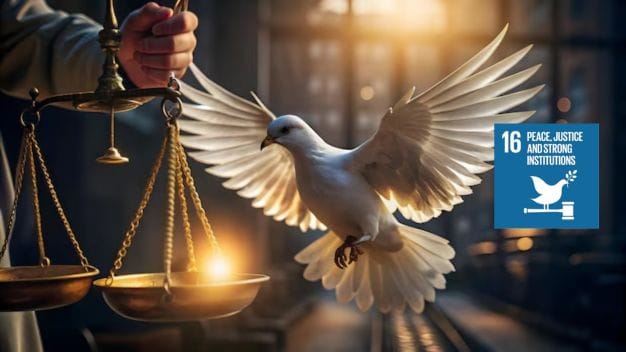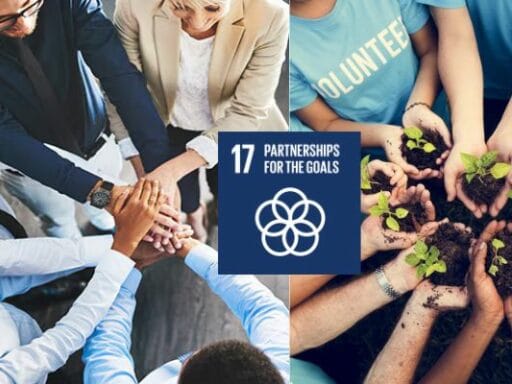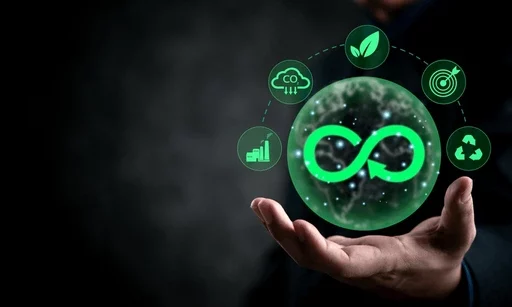One of the most ambitious objectives in the UN’s 2030 Agenda for Sustainable Development is SDG Goal 16. It aims to create inclusive, peaceful communities, provide everyone access to justice, and establish strong, responsible institutions at all levels. Reaching this objective is essential to building a just and equitable world in light of the growing number of international conflicts, corruption, and inadequate governance structures. This objective, which tackles important issues like lowering violence, fostering transparency, and upholding the rule of law, is the basis of sustainable development. Investigating its many facets is essential to realizing its significance and full potential.
The Importance of SDG Goal 16
Achieving sustainable development requires strong institutions, justice, and peace. Without these essential components, social progress remains a pipe dream and economic growth becomes precarious. In order to guarantee that societies flourish in settings free from injustice, discrimination, and violence, SDG Goal 16 is crucial. It highlights how crucial it is to establish just institutions that provide opportunities and legal safeguards to all people, irrespective of their background. In addition to promoting peace, a society founded on justice and equity creates the framework for long-term stability and prosperity.
There is much more to achieving SDG Goal 16 than just lowering conflict. It comprises giving disadvantaged groups—who frequently suffer the most from institutional injustices and social exclusion—more authority. The objective guarantees openness in governance and equity in decision-making procedures by encouraging accountability and fortifying institutions. It acknowledges that only when justice is available to everyone and no one is left behind can there be real peace.
The objective serves as a thorough foundation for advancing human rights, resolving structural injustices, and fostering communal social cohesiveness. It draws attention to the interdependence of sustainable development, showing that justice and peace are not mutually exclusive goals but rather essential elements of a flourishing community. In order to ensure a fair and inclusive future for all, SDG Goal 16 also asks for coordinated international efforts to address issues including organized crime, poor governance, and corruption. Countries may create robust institutions that protect human dignity and open the path for sustainable development by giving priority to these factors.
Global Challenges to SDG Goal 16
Corruption and Governance
One major obstacle to reaching SDG Goal 16 is still corruption. The poorest communities are disproportionately impacted by financial mismanagement, bribery, and embezzlement, which are frequently made possible by weak governance institutions. To guarantee just government, anti-corruption measures must be strengthened.
Inequalities and Justice
Systemic injustices prevent many groups from accessing justice. These disparities, whether brought about by socioeconomic, ethnic, or gender characteristics, impede the achievement of the objective. Addressing these issues requires promoting fair legal frameworks and inclusive policies.
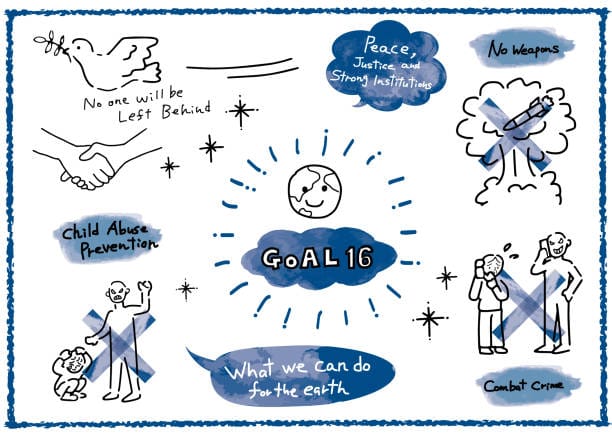
Building Strong Institutions
Strengthening Institutions
Strong institutions serve as the foundation for SDG Goal 16. Strengthening law enforcement and judicial systems guarantees their efficacy, fairness, and public accountability.
Inclusive Decision-Making
Giving communities a say in governance through inclusive decision-making procedures empowers them. Institutions are better suited to meet social requirements and provide equitable solutions when they incorporate a variety of viewpoints.
Access to Justice
A key component of SDG Goal 16 is access to justice. Everyone can protect their rights and pursue redress for complaints if legal services are made accessible and obstacles to the legal system are removed.
Promoting Peace and Transparency
Reducing Violence
Violence weakens social cohesiveness, undermines society, and impedes progress. SDG Goal 16 places a strong emphasis on lowering all types of violence, including organized crime, armed conflict, and domestic abuse.
Rule of Law
Everyone is subject to the same laws, regardless of their standing, according to the rule of law. It builds a basis for harmonious cohabitation and fosters faith in institutions.
Promoting Transparency
Public trust is increased via transparent government. Open-data platforms and participatory budgeting are two examples of initiatives that promote accountability and guarantee that resources are distributed fairly.
Case Studies: Real-World Applications
Rwanda: Rebuilding Peace Post-Genocide
Following the tragic 1994 genocide, Rwanda has emerged as a symbol of healing and resiliency. Rwanda has decreased violence and restored public confidence via judicial reforms and community-driven attempts at reconciliation. For example, the Gacaca courts supported SDG Goal 16 by enabling restorative justice between victims and offenders.
Norway: A Model of Inclusive Governance
Norway is a prime example of inclusive and open government. The nation has attained high levels of public confidence in institutions because to its strong legal system and anti-corruption initiatives. They provide an example for other countries aiming to accomplish SDG Goal 16 by ensuring that underrepresented voices are heard through their participative approach to decision-making.
Strategies for Achieving SDG Goal 16
Strengthening Accountability Mechanisms
Transparency is guaranteed by accountability systems such as independent anti-corruption organizations and ombudsman offices. These systems offer supervision and make organizations responsible for their deeds.
Human Rights Advocacy
A key component of SDG Goal 16 is respect for human rights. By defending the rights to free speech, the press, and assembly, people may express themselves without worrying about reprisals.
Community Participation
Participating in peacebuilding initiatives with communities promotes sustainability and ownership. Grassroots groups frequently possess the local expertise required to settle disputes and foster unity.
International Cooperation
Addressing transnational problems like organized crime, trafficking, and terrorism requires international collaboration. Cooperation between countries increases SDG Goal 16’s overall impact.
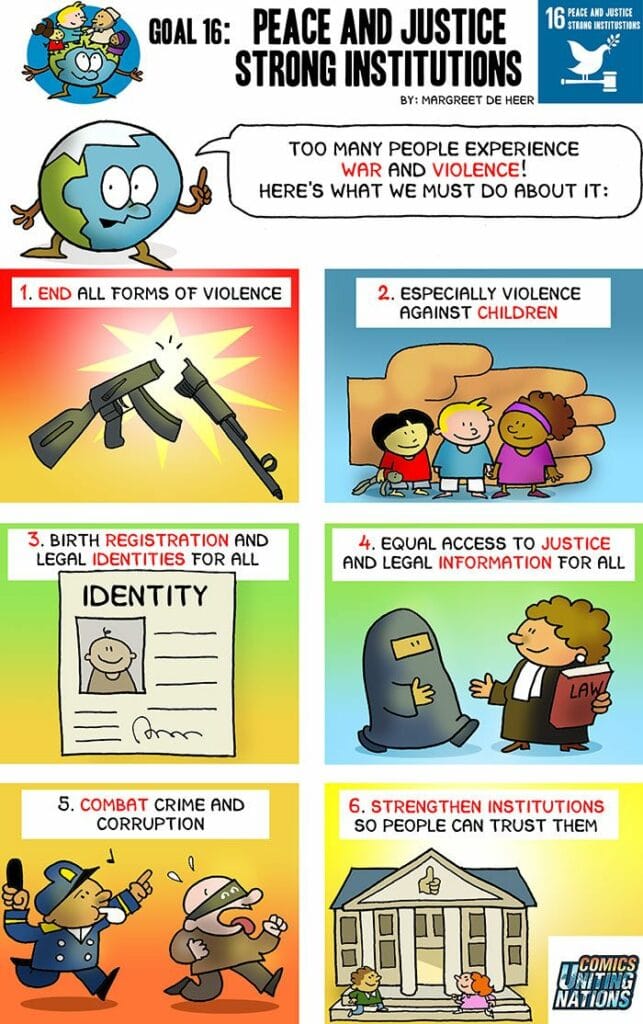
Monitoring and Evaluation Frameworks
Tracking progress toward SDG Goal 16 requires efficient monitoring and assessment systems. These frameworks offer a methodical way to evaluate how policies are being implemented, spot any gaps, and gauge the results of programs meant to advance justice, peace, and robust institutions. Countries may guarantee accountability and transparency in governance and facilitate evidence-based decision-making by utilizing trustworthy data. Strong monitoring systems also make it easier to match regional initiatives with worldwide goals, which promotes global collaboration. Improved assessment procedures enable stakeholders to take proactive measures to resolve issues, guaranteeing that initiatives continue to be inclusive, significant, and long-lasting.
The Role of Fherist in Advancing SDG Goal 16
At Fherist, we’re dedicated to advancing SDG Goal 16 by providing creative solutions that encourage accountability and openness. By allowing communities to monitor governance measures, our digital technologies make sure that institutions fulfill their obligations. Fherist supports the fundamental ideas of justice, peace, and robust institutions by encouraging public involvement and offering forums for discussion.
Conclusion
A pillar of the 2030 Agenda, SDG Goal 16 highlights the need of justice, peace, and strong institutions as necessary conditions for sustainable development. Governments, organizations, and individuals must work together to promote accountability, lessen violence, and guarantee justice for everyone in order to accomplish this aim.
The world may move closer to a time when justice and peace are universal rights rather than privileges through participatory decision-making, global collaboration, and improved governance structures. Together, we can achieve SDG Goal 16 and create a peaceful, just world for future generations.
Read More Here



